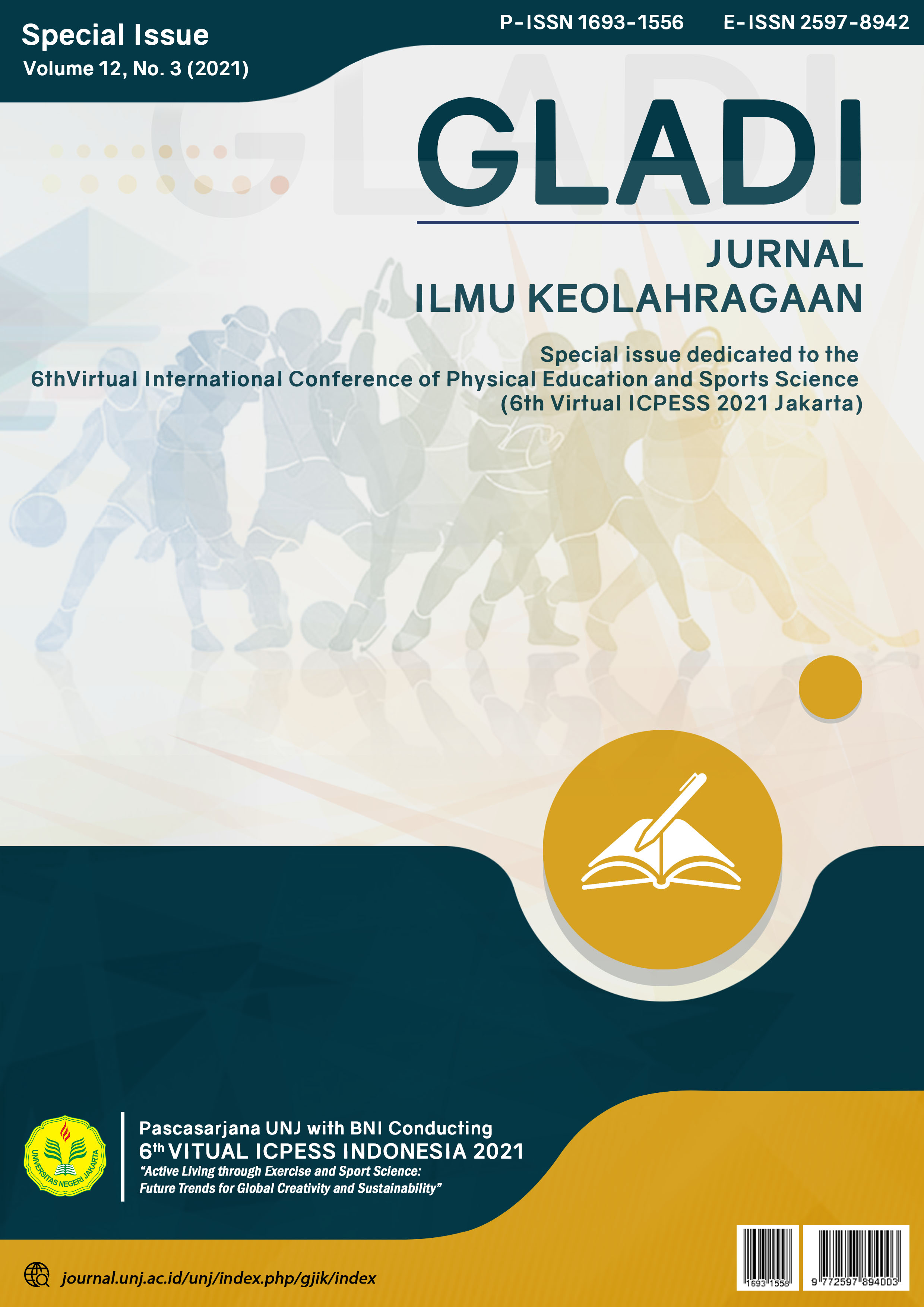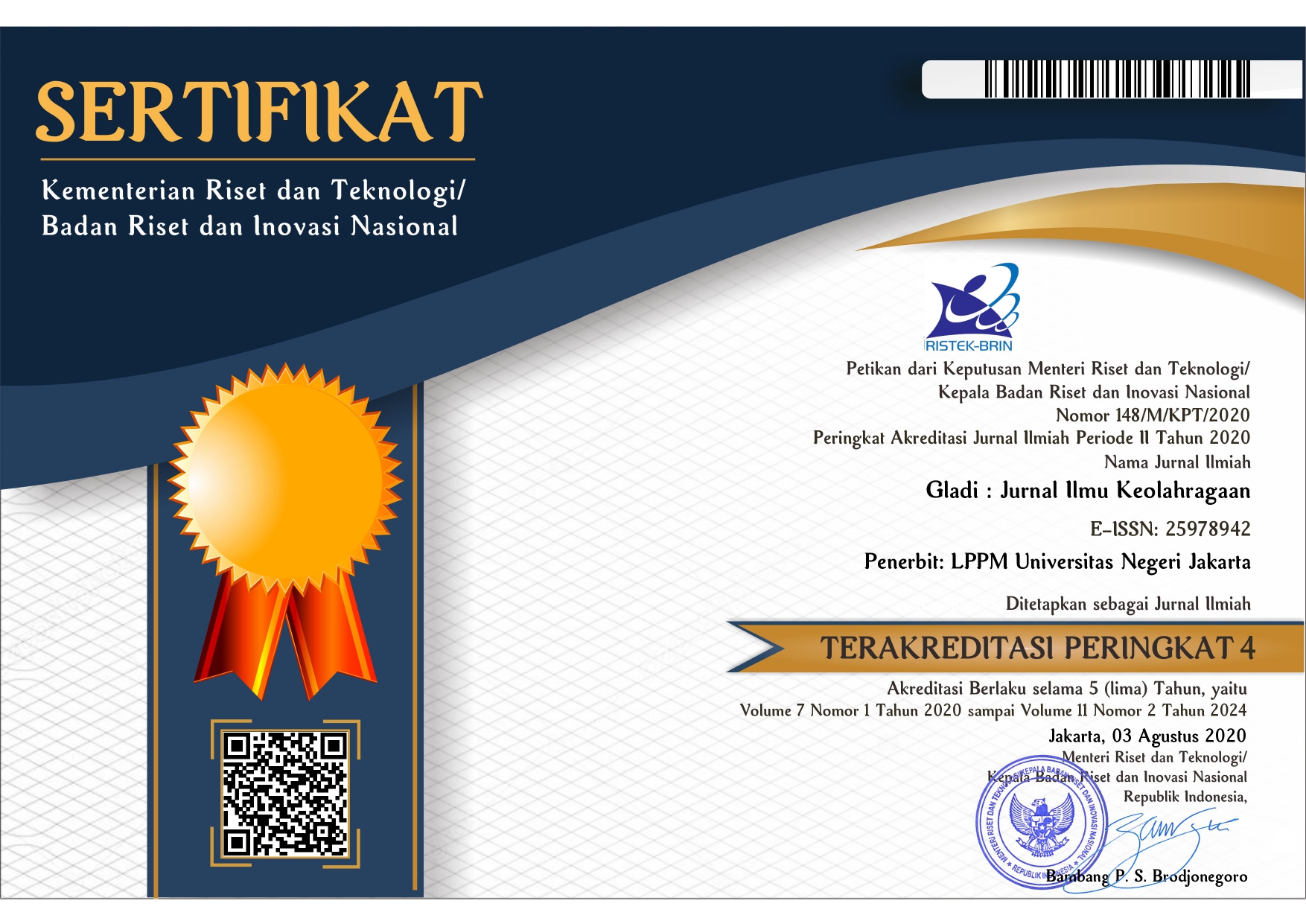The Effect of Traditional Games Gobak Sodor and Bentengan to Improvement Physical Fitness Students Elementary School
DOI:
https://doi.org/10.21009/GJIK.123.03Keywords:
Traditional Games, Gobak Sodor, Bentengan, Physical FitnessAbstract
This study aims to determine the effect of traditional Gobak Sodor and Bentengan game training on improving the physical fitness of grade V and VI-grade students of Sukagumiwang III Elementary School. The research method used in this research is an experimental method through pretest and posttest to determine the level of physical fitness. The population of this research was students consisting of 18 students of class V and 18 students of class VI with a total population of 36 people. While the sample was 30 people, the sampling was purposive namely male students in grades V and VI. The analysis technique used is the average test with the t-test formula. The results of hypothesis testing indicate that there is an effect of traditional games on increasing fitness. The results of descriptive calculations show that the initial test average data is 14.20%, the average final test is 20.60%, and there is an increase of 6.40% for class V. Whereas for class VI the average initial test is 14.60%, final test average. was 21.50% and an increase of 6.93%. The results of this study indicate that the traditional Bentengan game training is more influential than the traditional Gobak Sodor game, although the two matches have a significant effect on improving the physical fitness of students in grades V and VI of Sukagumiwang III Elementary School, Sukagumiwang District, Indramayu Regency.
Downloads
References
Fad, A. (2014). Kumpulan Permainan Anak Tradisional Indonesia. Swadaya Group.
Jayul, A., & Irwanto, E. (2020). Model Pembelajaran Daring Sebagai Alternatif Proses Kegiatan Belajar Pendidikan Jasmani di Tengah Pandemi Covid-19. Jurnal Pendidikan Kesehatan Rekreasi, 6(2), 190–199.
Kurniadi, Deni, S. P. (2010). Penjas Orkes Kelas V SD/MI (Kemdiknas). CV. Putra Nugraha.
Listyaningrum, D. (2018). Pengaruh Permainan radisional Gobak Sodor Terhadap Sikap Sosial Siswa Kelas III SDN 01 Manguharjo Kota Madiun. Gulawentah:Jurnal Studi Sosial, 3(2), 108. https://doi.org/10.25273/gulawentah.v3i2.3463
Mulyadi, M. (2018). Strategi Belajar Mengajar dengan Menerapkan Metode Demonstrasi untuk Meningkatkan Prestasi Belajar Penjaskes Materi Pertumbuhan dan Perkembangan Makhluk Hidup pada Siswa Kelas VII SMPN 3 Tanjung. Jurnal Langsat, 5(1), 45–48.
Nurhasan dan Hasanudin. (2007). Tes dan Pengukuran Keolahragaan. Bandung. Universitas Pendidikan Indonesia.
Raudsepp, L., & Jürimäe, T. (1997). Relationships of Physical Activity and Somatic Characteristics with Physical Fitness and Motor Skill in Prepubertal Girls. American Journal of Human Biology, 9(4), 513–521. https://doi.org/10.1002/(sici)1520-6300(1997)9:4<513::aid-ajhb11>3.0.co;2-p
Setyanto, A. E. (2013). Memperkenalkan Kembali Metode Eksperimen dalam Kajian Komunikasi. Jurnal ILMU KOMUNIKASI, 3(1), 37–48. https://doi.org/10.24002/jik.v3i1.239
Sugiyono. (2009). Metode Penelitian Administrasi. CV. Alfabeta.
Tarju, T., & Wahidi, R. (2017). Pengaruh Metode Latihan Terhadap Peningkatan Passing Dalam Permainan Sepak Bola. JUARA : Jurnal Olahraga, 2(2), 66. https://doi.org/10.33222/juara.v2i2.35
Widyastuti, Endang, S. A. (2010). Penjas Orkes Kelas VI SD/MI (Kemdiknas). CV. Putra Nugraha.







